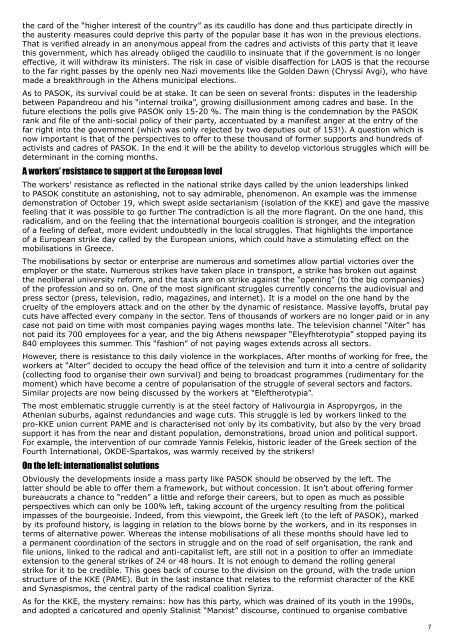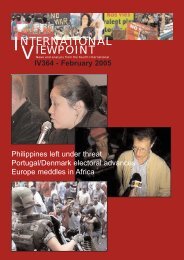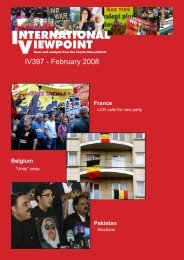download - International Viewpoint
download - International Viewpoint
download - International Viewpoint
You also want an ePaper? Increase the reach of your titles
YUMPU automatically turns print PDFs into web optimized ePapers that Google loves.
the card of the “higher interest of the country” as its caudillo has done and thus participate directly in<br />
the austerity measures could deprive this party of the popular base it has won in the previous elections.<br />
That is verified already in an anonymous appeal from the cadres and activists of this party that it leave<br />
this government, which has already obliged the caudillo to insinuate that if the government is no longer<br />
effective, it will withdraw its ministers. The risk in case of visible disaffection for LAOS is that the recourse<br />
to the far right passes by the openly neo Nazi movements like the Golden Dawn (Chryssi Avgi), who have<br />
made a breakthrough in the Athens municipal elections.<br />
As to PASOK, its survival could be at stake. It can be seen on several fronts: disputes in the leadership<br />
between Papandreou and his “internal troika”, growing disillusionment among cadres and base. In the<br />
future elections the polls give PASOK only 15-20 %. The main thing is the condemnation by the PASOK<br />
rank and file of the anti-social policy of their party, accentuated by a manifest anger at the entry of the<br />
far right into the government (which was only rejected by two deputies out of 153!). A question which is<br />
now important is that of the perspectives to offer to these thousand of former supports and hundreds of<br />
activists and cadres of PASOK. In the end it will be the ability to develop victorious struggles which will be<br />
determinant in the coming months.<br />
A workers’ resistance to support at the European level<br />
The workers’ resistance as reflected in the national strike days called by the union leaderships linked<br />
to PASOK constitute an astonishing, not to say admirable, phenomenon. An example was the immense<br />
demonstration of October 19, which swept aside sectarianism (isolation of the KKE) and gave the massive<br />
feeling that it was possible to go further The contradiction is all the more flagrant. On the one hand, this<br />
radicalism, and on the feeling that the international bourgeois coalition is stronger, and the integration<br />
of a feeling of defeat, more evident undoubtedly in the local struggles. That highlights the importance<br />
of a European strike day called by the European unions, which could have a stimulating effect on the<br />
mobilisations in Greece.<br />
The mobilisations by sector or enterprise are numerous and sometimes allow partial victories over the<br />
employer or the state. Numerous strikes have taken place in transport, a strike has broken out against<br />
the neoliberal university reform, and the taxis are on strike against the “opening” (to the big companies)<br />
of the profession and so on. One of the most significant struggles currently concerns the audiovisual and<br />
press sector (press, television, radio, magazines, and internet). It is a model on the one hand by the<br />
cruelty of the employers attack and on the other by the dynamic of resistance. Massive layoffs, brutal pay<br />
cuts have affected every company in the sector. Tens of thousands of workers are no longer paid or in any<br />
case not paid on time with most companies paying wages months late. The television channel “Alter” has<br />
not paid its 700 employees for a year, and the big Athens newspaper “Eleyfhterotypia” stopped paying its<br />
840 employees this summer. This “fashion” of not paying wages extends across all sectors.<br />
However, there is resistance to this daily violence in the workplaces. After months of working for free, the<br />
workers at “Alter” decided to occupy the head office of the television and turn it into a centre of solidarity<br />
(collecting food to organise their own survival) and being to broadcast programmes (rudimentary for the<br />
moment) which have become a centre of popularisation of the struggle of several sectors and factors.<br />
Similar projects are now being discussed by the workers at “Eleftherotypia”.<br />
The most emblematic struggle currently is at the steel factory of Halivourgia in Aspropyrgos, in the<br />
Athenian suburbs, against redundancies and wage cuts. This struggle is led by workers linked to the<br />
pro-KKE union current PAME and is characterised not only by its combativity, but also by the very broad<br />
support it has from the near and distant population, demonstrations, broad union and political support.<br />
For example, the intervention of our comrade Yannis Felekis, historic leader of the Greek section of the<br />
Fourth <strong>International</strong>, OKDE-Spartakos, was warmly received by the strikers!<br />
On the left: internationalist solutions<br />
Obviously the developments inside a mass party like PASOK should be observed by the left. The<br />
latter should be able to offer them a framework, but without concession. It isn’t about offering former<br />
bureaucrats a chance to “redden” a little and reforge their careers, but to open as much as possible<br />
perspectives which can only be 100% left, taking account of the urgency resulting from the political<br />
impasses of the bourgeoisie. Indeed, from this viewpoint, the Greek left (to the left of PASOK), marked<br />
by its profound history, is lagging in relation to the blows borne by the workers, and in its responses in<br />
terms of alternative power. Whereas the intense mobilisations of all these months should have led to<br />
a permanent coordination of the sectors in struggle and on the road of self organisation, the rank and<br />
file unions, linked to the radical and anti-capitalist left, are still not in a position to offer an immediate<br />
extension to the general strikes of 24 or 48 hours. It is not enough to demand the rolling general<br />
strike for it to be credible. This goes back of course to the division on the ground, with the trade union<br />
structure of the KKE (PAME). But in the last instance that relates to the reformist character of the KKE<br />
and Synaspismos, the central party of the radical coalition Syriza.<br />
As for the KKE, the mystery remains: how has this party, which was drained of its youth in the 1990s,<br />
and adopted a caricatured and openly Stalinist “Marxist” discourse, continued to organise combative<br />
7









